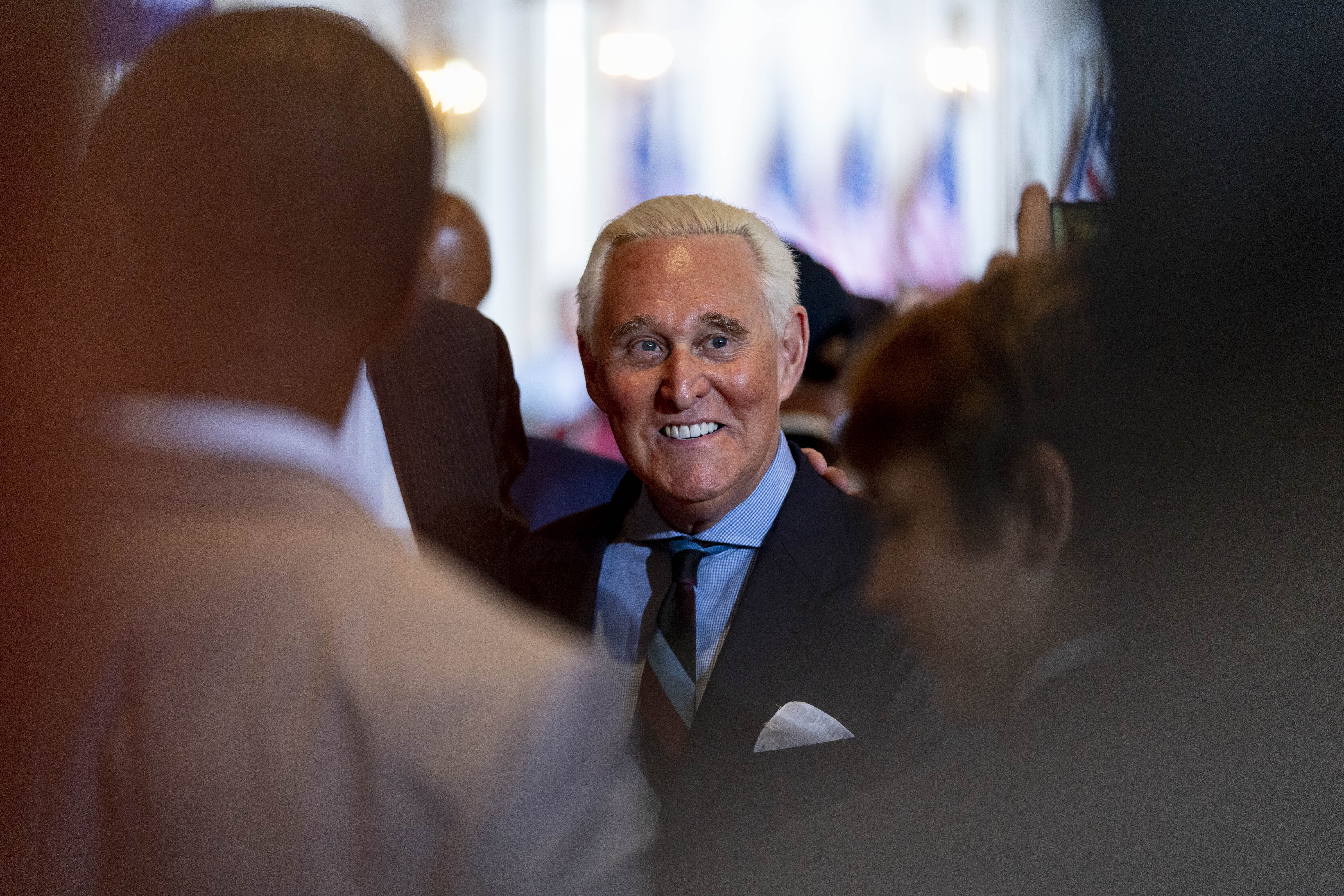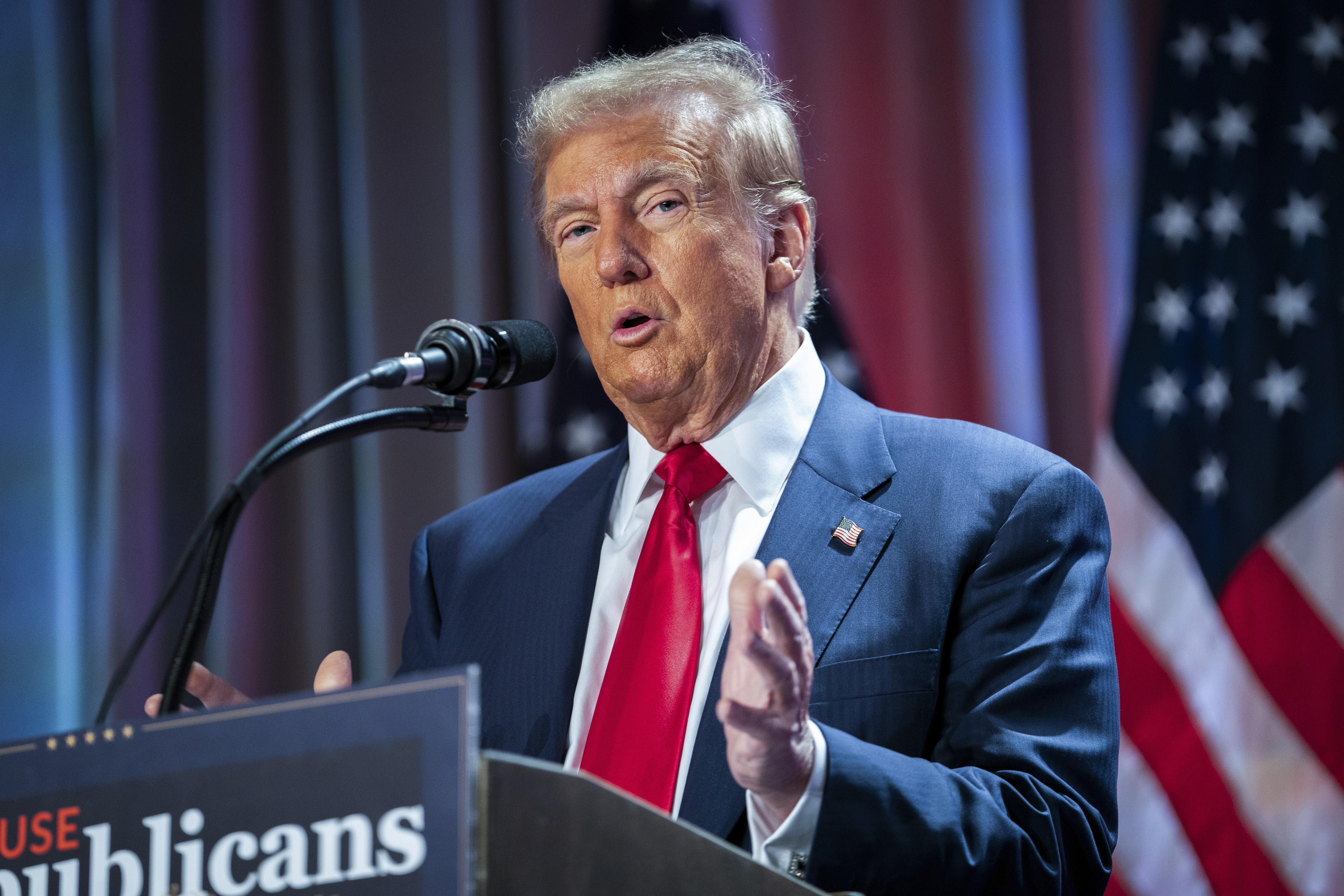ALBANY, New York — A 42-year-old boxer in upstate New York is leveraging the 100-foot sign he built to support Donald Trump — and allies like Roger Stone and the president-elect’s son — into a bid to succeed Rep. Elise Stefanik.
The man behind the sign, Anthony Constantino, wants Stefanik’s House seat and has been meeting GOP leaders with the power to select a nominee to replace her.
Constantino, who founded the printing company Sticker Mule, has ties to the Trump family. He told POLITICO he ate dinner with Donald Trump Jr. earlier this year and visited Mar-a-Lago in November. He’s also received support and unpaid advice from Stone, a longtime Trump ally.
Now, Constantino is applying the recognition he received for his enthusiastic Trump support — and a public fight with local officials over his sign — to a House run. His platform, in large part, is to counteract hatred toward the incoming president.
“The country needs more people like President Trump, Elon Musk, people like myself who don’t aspire to be politically involved people, but just want to do what’s right for the country,” Constantino said in an interview.
A special election for the sprawling, heavily Republican district — which runs from the outskirts of Albany to the Canadian border — has not been called, and Stefanik remains a House member as her nomination to the U.N. is pending Senate confirmation. A direct endorsement in the race from Trump or Stefanik would likely be one the biggest factors for county leaders in making their selection. It would also be highly coveted by the candidates, but many have kept a low profile — in part out of deference to Stefanik and to not be seen as over eager.

“Why would you not want to hear the input from Team Elise and Team Trump?” Fulton County GOP Chair Susan McNeil said. “Of course we want to hear from them.”
Trump has dipped into the House GOP conference to stock his administration — selections that will trigger special elections in states like New York and Florida. Those moves will temporarily shrink his party’s already narrow majority, but the incoming president could solidify his hold over the party by choosing favored successors for those lawmakers.
In the past, Trump has had a mixed record with his political endorsements — with sometimes disastrous consequences for Republicans. He backed scandal-scarred Senate candidates like Alabama’s Roy Moore and Herschel Walker in Georgia; both lost to Democrats.
Constantino, who has a flair for self-promotion on conservative podcasts and cable TV, fits into the mold of a new wave of candidates who’ve emerged in the Trump era. He has a near-constant presence on X where he shares his media appearances, highlights his business and promotes charitable causes.
If he becomes the nominee, he would leapfrog stalwart Republicans who are also vying for Stefanik’s seat. The group includes state lawmakers, a former House candidate and the party’s 2022 nominee for U.S. Senate, Joe Pinion. But Constantino has taken a more circuitous route to both the campaign and politics, underscoring how Trump has upended the regular order of the Republican Party — even on a local level.

Trump’s transition team did not respond to messages seeking comment on a possible endorsement.
Constantino is a former Democrat, having registered in the party when a high school friend was running for office in Albany. He recently changed his registration to the GOP, but one Republican county chair told POLITICO they did not see the party conversion as a deal-breaker.
All of the prospective candidates are pro-Trump, in keeping with a party that has been subsumed by the president-elect’s base. Stefanik, who was initially critical of Trump, zealously defended him during his first impeachment trial.
But Constantino fits into a different category entirely with his support of Trump. Compared to his rival Republicans, he would likely draw the most national attention.
The boxing pro gained fame among Trump supporters over the summer when he constructed a giant sign in the upstate New York city of Amsterdam in support of the GOP presidential nominee. Constantino said he was moved to do so after the attempt on Trump’s life at a Pennsylvania rally.
“One of the biggest problems in the country is anti-Trump hate and hatred toward Trump supporters,” Constantino said.
The sign led to controversy, and the city’s Democratic mayor sought a court order for it to be removed on the grounds it was too distracting for drivers. Constantino’s subsequent fight with the local government turned him into an overnight star with Trump’s MAGA base — and with the incoming president. Stone took notice and reached out, and Constantino received a letter of support from Trump himself. He later dined with Don Jr.
A state court ultimately sided with him over the sign, allowing it to stay up in time for a party. The mayor, Michael Cinquanti, did not return messages seeking comment.
The dispute with municipal bureaucrats and elected officials brought Constantino attention from conservative media outlets like Newsmax and Fox News. Stone, who has been active in New York politics over the years, praised him on a podcast, comparing him to Trump and Ronald Reagan.

“I would argue that your lack of political experience is not a negative, it’s actually a plus,” Stone told him. “This is what the Founding Fathers actually envisioned.”
Stone did not return messages seeking comment. But Constantino — who acknowledged “there is a mixed opinion about Roger” — is taking advice from the notorious Republican operative whose 40-month prison sentence for obstruction was commuted by Trump in 2020.
“Roger appreciated what I did with the sign,” he said. “I got to know him through that. He’s been one of my biggest advocates.”
Constantino founded Sticker Mule, a company that sells customized stickers, labels and packaging in 2010. He employs more than 1,200 people and is based in Amsterdam, an upstate city about 40 minutes west of Albany. The majority of the company’s workers are based in upstate New York, but it also has a presence in Italy to service the European market. In 2022, Constantino became a professional boxer. He has a 4-1 record, which includes three professional fights, but has put his fighting career on hold.
Entering the political ring, of course, is a different type of challenge. He formed a campaign committee this month and, if he’s not tapped by local Republican leaders to run in the special election, plans to run outright for the GOP nomination in the 2026 election.
Constantino will fund his campaign with $2.6 million he said was earned when investing in the electric vehicle company Tesla — stock purchased when the share price dipped after Musk bought Twitter. Constantino posted a screenshot purporting to be his brokerage account as evidence he has the money.
Republican county chairs in the district are not expected to make their decision until after Stefanik receives Senate confirmation. Still, some local GOP leaders are intrigued by Constantino’s unusual path to politics.
“Like millions of Americans he’s become politically aware following Donald Trump — and a new brand of politics,” Saratoga County Republican Chair Joe Suhrada said.






